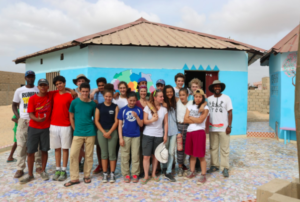On Monday, June 31, a cohort of students, faculty, and staff gathered to debate a new name for the Learning Village. To equitably ensure the diversity of opinions in the meeting, the committee was selected by a representative body, which was elected by another committee, which was chosen by affinity club leaders and the faculty and student inclusion chairs. Many students have already begun protesting the selection process, citing fundamental bias in representative democracy.
Despite concerns about the fairness of the committee, all participants agreed to go ahead with the meeting.
The discussion began with a 45-minute review of the community norms; each person shared what each norm meant to them. The review was followed by a 15-minute written reflection about how to effectively practice the habits of mind in a discussion setting.
Lastly, a member of the administration asked for a moment of silence to appreciate the factory workers that made the chairs and tables in the room. Following the silence, the meeting began.
A Lick-Wilmerding junior, the leader of the club, “Students Against the Name Learning Village,” explained why the meeting was called, “Hundreds of years ago, there was an Ohlone village on this very land. Colonial expansion and disease wiped out the villagers and European settlers stole the land for their own. Therefore, when the administration named the classrooms the Learning Village, they whitewashed the long history of oppression and colonialism that allowed our school to ultimately exist on this land.”
The rest of the room nodded in approval, except for the representative from the club, “Students Against the ‘Students Against the Name Learning Village.” Note: when asked about the confusing double negative, the representative explained that it was much more fun to be against something than in favor of something else.
The SASALV representative began, “I just think it’s stupid that—,” but she was cut off by shouts of disapproval from the rest of the room. The other students, faculty, and staff collectively pointed to the list of community norms hanging on the wall. The student was asked to leave the room for not “respect[ing] the messiness of ideas.”

The meeting resumed when another student, the leader of the “Students Adamantly Opposed to the Name Trailers,” claimed, “I also think calling the temporary classrooms the ‘trailers’ is hurtful. Trailer parks have long been an affortable living space for many in America. By calling these expensive buildings ‘trailers,’ we are being insensitive to the members of our community who’ve lived in trailers, or have family members that’ve lived there.”
The other representatives murmured in agreement, and a history teacher added, “But even more than that, trailers are often temporary living spaces after natural disasters. Especially after Hurricanes Katrina, Jose, Harvey, and Irma, and the earthquakes in México, calling our expensive buildings ‘trailers’ disregards the thousands of people around the world who have been forced to live in trailers after losing their homes.”
People snapped emphatically. After a pause, another student said, “these are all great points, but what names do you all actually like?”
There was a long pause as many struggled to think of a suggestion. One teacher finally exclaimed, “Wait, did you say ‘you’?” The student responded, “Yes, of course, I was asking you all a question.”
The teacher smiled, laughed briefly, and explained, “If you’d paid attention earlier, you’d know that one of our community norms is to ‘Speak from the I perspective.’ You should not have said ‘you,’ because you naively tried to speak for the rest of us.” The rest of the representatives gasped in realization, then snapped in agreement.
The student protested, “But I was asking you a question, and didn’t you just say ‘you’ like four tim—” but he was cut off by jeers from others in the room. They continued to yell over him until he left the room in tears.
The meeting began again as a faculty representative from the “Students Categorically Against the Name Bungalows” protested calling the classrooms bungalows. He explained that the use of the term “bungalows” for small houses originated in what is now Bangladesh. Colonists stole the name and architecture and used them in England, and eventually in America. He argued that calling the classes bungalows was “a hurtfully unapologetic example of cultural appropriation. Being 1/93 Bengalese, I am insulted by the term.” When a biology teacher politely asked how one can be 1/93 of something, the representative screamed in response, “You can’t tell me how to identify!”
The biology teacher was then removed from the room for not “suspend[ing] judgement of self and others.”
The meeting continued for another two hours, as more people shared names they did not like. Even the names “classes,” and “classrooms” were eventually vetoed (no one interviewed can remember why, but some speculate that it had to do with concerns about the history of classism).
More and more representatives were dismissed as the meeting went on. One teacher finally lost her composure, screaming, “Are you kidding me? Can’t we just pick a name and get the hell out of this room?!” There was a long silence, and then the other representatives asked the teacher to leave the room for not “lean[ing] into discomfort,” and embracing the complexity of the conversation. On her way out, the teacher said that she never wanted to be on this committee in the first place, and she “should’ve just taken a job in Texas like my Dad told me to.”
Eventually, only one student remained in the room. In an interview after the meeting, the student said he felt “really uncomfortable, and unsure of what to do” because there was nothing left to protest. He eventually decided on the name “Undesignated Schooling Areas.”
After the meeting, the administration vetoed the name. They were concerned that the initials U.S.A. would silence individuals from America’s historically oppressed groups.
Thereafter, for the time being, the administration has asked that students refrain from mentioning what was formerly called the “Learning Village.” There will be a debrief open to all students next Monday, when the representatives will reflect on their experiences in the meeting.






